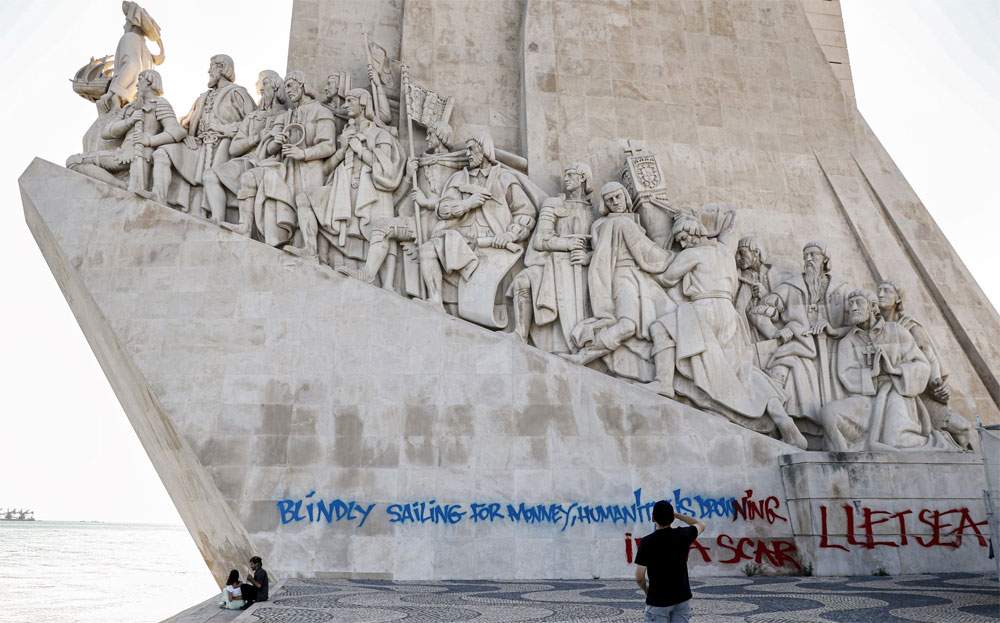Lisbon’s Monument to the Discoveries, the celebrated monument by architect José Ângelo Cottinelli Telmo and sculptor Leopoldo de Almeida installed in 1960 in the Belem district on the banks of the Tagus River to celebrate the discoveries made by Portuguese navigators between the fifteenth and sixteenth centuries, was damaged on the night of Aug. 8-9 with large anti-imperialist writings. Unknown vandals affixed blue paint lettering to the monument that reads “Blindly sailing for money, humanity is drowning in a scarlet sea.” In all, the inscription took up twenty meters of the base of the monument, which depicts a traditional stylized Portuguese caravel with, on the prow, the statue of Henry the Navigator, Portugal’s infante and one of the country’s earliest explorers, and on the deck the statues of many Portuguese illustrious (such as King Alfonso V, navigators Vasco da Gama and Ferdinand Magellan, painter Nuno Gonçalves, explorers António de Abreu and Diogo Cão, historian João de Barros, and many others).
However, the colossal monument, known locally as Padrão dos Descobrimentos, was immediately cleaned up: the dye used for the inscription did not, in fact, impregnate the white stone from which the Padrão’s base was made, and as a result as early as August 13 restorers were able to remove all traces of it. Visitors (before the pandemic, there were at least a thousand visitors a day going there, now they have dropped but still the flow is still sustained) were thus able to see it cleaned up again. “Fortunately,” the monument’s director, Margarida Kol Carvalho, told TSF newspaper, “the paint had not soaked through and the work was easier and faster than expected.” Now, however, Kol Carvalho is calling for more vigilance to protect the site: “The security of the monument outside is not our responsibility: there is a security company that watches over this space every day by making frequent patrols.” Increasing security is therefore an issue that needs to be addressed in consultation with the Lisbon City Council, the director explained.
Since the Padrão dos Descobrimentos is considered by many to be a symbol of Portuguese colonialism (which was responsible in the past for human trafficking to South America), it has also been the target of vandalism attempts in the past. “This is a protest movement that takes place not only in Portugal, but all over the world,” points out Kol Carvalho, who, however, reasons for finding a solution. “In recent years,” he explains, “we have been working on the themes of imperialism, colonialism and colonial memory, through study and critical reflections on these issues.” In this regard, there is currently an exhibition inside the Padrão dos Descobrimentos, entitled Visões do Império, on Portuguese colonialism in the 19th century, an example, Kol Carvalho concludes, “of knowledge sharing based on research, on the work of many academic researchers.” The best way to work on dissonant heritage.
Photo: Graça Martins
 |
| Lisbon, vandalized (and immediately cleaned) the celebrated Monument to the Discoveries |
Warning: the translation into English of the original Italian article was created using automatic tools. We undertake to review all articles, but we do not guarantee the total absence of inaccuracies in the translation due to the program. You can find the original by clicking on the ITA button. If you find any mistake,please contact us.